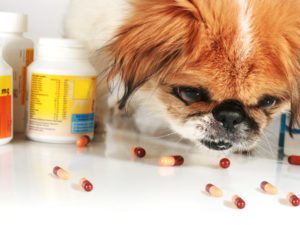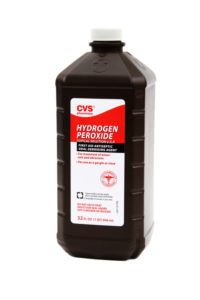My Dog Ate Ibuprofen But is Acting Fine – What Do I Do?
My Dog Ate Ibuprofen But is Acting Fine – What Do I Do?
Ibuprofen is unsafe to give your dog under any circumstances. However, there are canine-appropriate prescription NSAIDS that are available from your vet.
If your dog ate Ibuprofen but is acting fine, you should still contact your vet or animal poison control. They will have you bring your dog to the vet, or you will need to administer hydrogen peroxide by mouth. Accidental poisoning can lead to a fatal end result if not treated in time.
If you believe your canine has ingested Ibuprofen, do not wait until signs are present to take action. Check out this article to understand what to do if your canine consumes Ibuprofen.

Exactly What is Ibuprofen?
Ibuprofen is an anti-inflammatory medicine, without steroids, explicitly made for humans. One example of Ibuprofen is Advil™. It is used to relieve temperature, pain, and inflammation.
Advil is unsuitable for dogs or cats, as it inhibits the prostaglandins necessary to protect the kidneys and gastrointestinal system. Advil also blocks harmful pro-inflammatory prostaglandins that can precipitate conditions such as arthritis.
There are, however, approved NSAIDs for pups and cats. These medicines will only block the harmful inflammatory prostaglandins. You should keep your companion animals away from any human medicine, as the results can be disastrous.
What is Ibuprofen Poisoning?
Medications like Advil are hazardous to dogs. Poisoning can occur if your pet ingests their human parent’s medications. You should also never administer any human medication to your pets. For example, while Advil is safe for most people, even one or two pills can seriously harm your pet. In fact, administering Ibuprofen to your dog or cat can lead to a fatal outcome.
Symptoms of Ibuprofen Poisoning in Dogs
Even if your dog seems fine after ingesting Ibuprofen, it can cause serious damage. If you suspect your pup has gotten into your medicine cabinet, you need to take action and get them to the vet right away or call the ASPCA Animal Poison Control, and they can tell you what to do. Some of the signs of ibuprofen poisoning in dogs include:
- Vomiting
- Diarrhea
- Pale gums
- Incoordination
- Lack of appetite
- Blood in stool or vomit
- Increased urination
- Increased thirst
If the poisoning is serious enough, it can even lead to acute kidney failure, ulcers in the stomach, tremors, seizures, and coma. Ibuprofen poisoning can have a fatal outcome if not treated in time. If your pup ingested Ibuprofen, your vet would likely want to run blood tests to assess the extent of the damage done.
What is Treatment for Ibuprofen Poisoning? 
The severity of toxicity typically depends on the amount ingested. If your dog has ingested Ibuprofen and cannot get to the emergency vet in time, vomiting may be induced at home. You must contact poison control or your veterinarian and follow their instructions. You will likely be instructed to induce vomiting by giving your pup hydrogen peroxide.
The typical dose for poisoning is 1 teaspoon per 5 pounds of the dog’s weight. For example, if they weigh 20 pounds, you would give them 4 teaspoons of hydrogen peroxide. You should never exceed 3 tablespoons for a pup who weighs over 45 pounds. If inducing vomiting does not work, your vet may need to give your canine-activated charcoal.
The activated charcoal will prevent the gastrointestinal tract from absorbing the medication and potentially keep side effects from escalating. It is also essential to control the vomiting and try to combat dehydration. Sometimes the vet will need to give fluid therapy, depending upon the severity of the case. The vet may give your dog anti-vomiting or antacid medicine.
A blood transfusion may be required, alongside supportive care. Your canine will likely have to stay at the emergency vet. Medications may also be required to protect the liver and medicine to decrease seizure activity.
Depending on the dog’s condition, they may need extensive follow-up care. Whether you induce vomiting at home or take your pup to the emergency vet, taking your dog for bloodwork after accidental poisoning is always pertinent.
What Treatment Looks Like After Hospitalization
Ibuprofen poisoning is a serious business; follow-up care is often required to ensure the pup’s liver and kidneys function normally. If there is severe damage, fluids under the skin should be administered at home. It is crucial to adhere to the vet’s instructions.
Medications and follow-up care may be prolonged for several weeks or occasionally even months. In most cases of toxicity, the dog must eat a bland diet of plain white chicken and white rice for several days after the incident.
What Are Good Alternatives to Ibuprofen?
If your pup is in pain, do not give them human Ibuprofen. Do not allow your pup to have any human pain medicine. Instead, you should take your dog to the vet, and they can prescribe your dog any of the following canine-specific NSAIDS:
- Rimadyl®
- Deramaxx
- Metacam
- Previcox
The above prescription pain medications can be safely given to your dog under the supervision of your trusted veterinarian. They are utilized for short-term pain alleviation and are anti-inflammatories. A drug called Galliprant is another prescription medicine specifically for dogs. It is labeled for long-term use in pups who suffer from osteoarthritis.
You can also use omega-3 fatty acids, glucosamine, and chondroitin to help ease aching joints and keep your pup strong and healthy. Nutamax makes a popular glucosamine and chondroitin product for dogs. It is called Cosequin®, and you can get them at pet stores like PetSmart and Petco. You can also get them at Walmart, which is available online.
Your dog may also benefit from physical therapy and acupuncture. Prior to you doing anything, you have to speak to your vet about what is best for your canine companion.
Conclusion
You should never allow your dog to have human medications like Ibuprofen, as it is unsafe for pups. In case of accidental poisoning, contact your vet or animal poison control for instructions.
For dog parents in the Plymouth Meeting, PA area, The Village Vets are available to serve you and your dog. Call us today at (484) 820-1700 or make an appointment.
Recent Posts
About The Village Vets
The Village Vets of Plymouth Meeting offers excellent service to clients in a comfortable, friendly atmosphere. To learn more about us and how we can better serve you and your pet here in Plymouth Meeting, PA, click the button below.
Share This Post
Recent Posts
About The Village Vets
The Village Vets is a network of three animal hospitals based in Atlanta, GA and the surrounding area. We offer honest, excellent service to our clients in a comfortable, friendly atmosphere. To learn more about our locations and how we can better serve you and your pet, click the button below.





